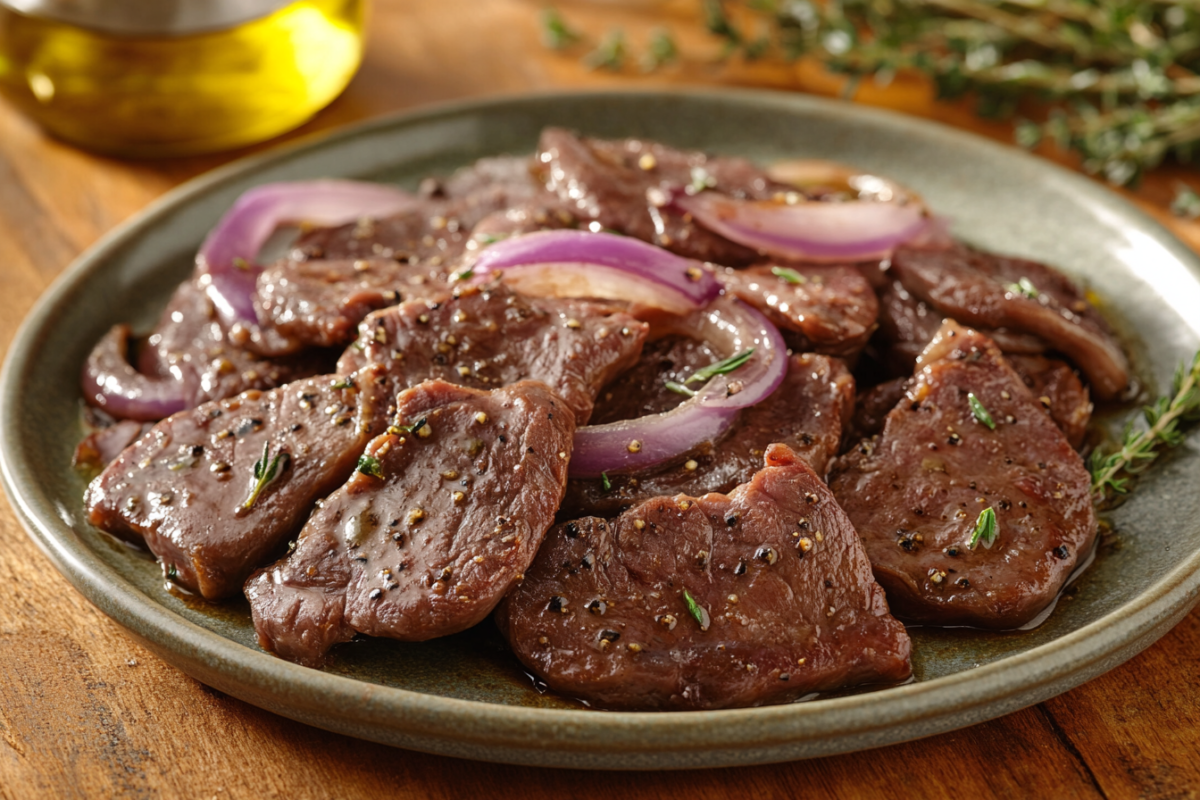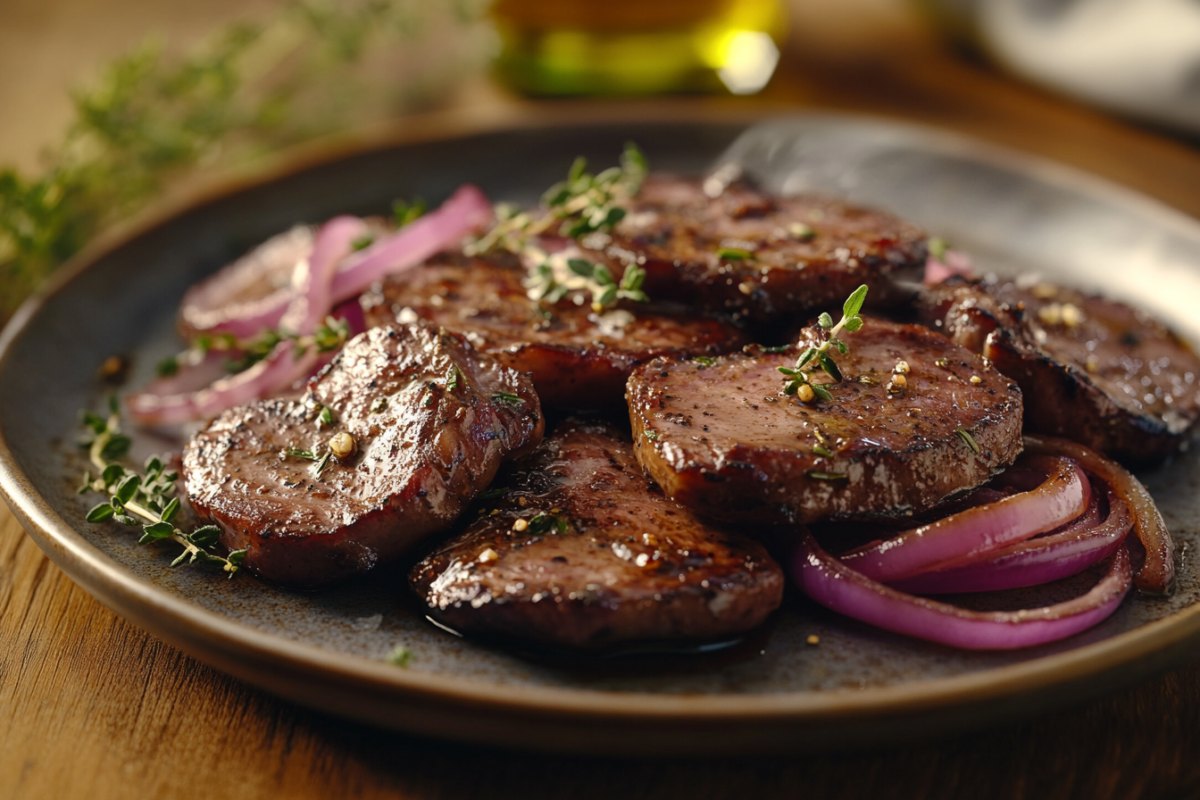Beef liver is often overlooked, but it’s a powerhouse of nutrition and health benefits. Packed with vitamins, minerals, and high-quality protein, this nutrient-dense organ meat has been a staple in many cultures for centuries. While the thought of eating liver might make some cringe, it’s actually one of the healthiest foods you can eat. From boosting your immune system to providing essential nutrients like Vitamin A, B12, and iron, beef liver is truly a superfood. In this article, we’ll explore the health benefits, nutritional profile, and even share some delicious beef liver recipes to help you incorporate this powerhouse ingredient into your diet.
What Is Beef Liver?
What Exactly Is Beef Liver?
Beef liver is the organ meat harvested from cows, often classified as offal or organ meat, which includes other organs like kidneys, heart, and tongue. While it may not be as widely celebrated in modern diets, beef liver was once a go-to food for those looking to get a hearty dose of essential nutrients. It’s often considered one of the most nutrient-dense foods on the planet, thanks to its rich supply of vitamins and minerals.
In fact, many people still prefer beef liver for its unique flavor and health-boosting properties. It’s packed with iron-rich compounds and loaded with vitamins like Vitamin A and B12, making it a superb option for anyone looking to improve their overall health. Additionally, its high protein content supports muscle growth and tissue repair, which is why it’s favored by athletes and bodybuilders.
Beef Liver: A Historical Perspective
Before modern supplements, beef liver was considered an essential part of a healthy diet. In many cultures, beef liver was consumed regularly, either fresh, dried, or even made into a pâté. It was even used as a remedy for ailments such as anemia and fatigue due to its high iron and B12 levels. Today, this nutrient powerhouse is making a comeback as people rediscover the health benefits of organ meats.
While it may not be as trendy as kale or quinoa, beef liver’s nutritional profile is hard to beat. With just a few servings a week, you can boost your intake of many vital nutrients. Plus, when sourced from healthy, grass-fed cows, it provides a more sustainable and ethical option compared to other animal products.
Nutritional Profile of Beef Liver
Macronutrients in Beef Liver
When it comes to nutritional powerhouse foods, beef liver stands tall. It’s packed with high-quality protein, offering a hefty dose in every serving. A 3.5-ounce (100-gram) portion of beef liver provides roughly 26 grams of protein, making it a fantastic option for anyone looking to build muscle, recover from workouts, or support overall tissue repair. And since this protein is complete, it contains all nine essential amino acids, ensuring your body has everything it needs to function at its best.
As for fat, beef liver isn’t exactly low-fat, but the fats it contains are mostly healthy. It has about 4 grams of fat per 3.5-ounce serving, including healthy monounsaturated and polyunsaturated fats. These fats support brain function, improve cholesterol levels, and keep your heart healthy. Beef liver also contains a small amount of omega-3 fatty acids, which are vital for reducing inflammation and improving cardiovascular health.
Regarding carbohydrates, beef liver is virtually carb-free, which makes it an excellent choice for anyone following a low-carb or keto diet. The absence of carbs also means it’s rich in nutrients without spiking your blood sugar levels, making it an ideal food for maintaining stable energy throughout the day.
Vitamins and Minerals Abundance in the Beef liver
One of the biggest reasons to include beef liver in your diet is its rich supply of vitamins and minerals. Let’s dive into the specifics of what makes beef liver so unique.
High Levels of Vitamin A
Beef liver is a superstar when it comes to Vitamin A. A single serving can provide you with more than 100% of your daily recommended intake of this essential nutrient. Vitamin A plays a crucial role in supporting healthy vision, immune function, and cell growth. It’s also a potent antioxidant, helping to combat oxidative stress and slow the aging process. Since Vitamin A is fat-soluble, consuming beef liver with a small amount of healthy fat (like olive oil or avocado) can help your body absorb it more effectively.
Rich Source of Vitamin B12
If you’re looking to up your Vitamin B12 intake, beef liver is one of the best natural sources. Just one serving of beef liver can provide you with more than 3,000% of your daily needs for this vitamin. Vitamin B12 is essential for brain health, nerve function, and red blood cell production. It’s particularly important for those on plant-based diets, as it’s mainly found in animal products. By including beef liver in your meals, you can maintain healthy energy levels, prevent neurological issues, and support your cardiovascular system.
Iron Content and Its Benefits
Beef liver is also a top-tier source of heme iron, the type of iron that’s most easily absorbed by your body. Just one serving of beef liver provides over 30% of your daily iron requirement. This is great news for anyone struggling with iron deficiency or anemia. Iron plays a key role in producing hemoglobin, the protein in red blood cells that carries oxygen to your tissues and organs. By consuming beef liver regularly, you can boost your iron levels and reduce symptoms like fatigue, weakness, and dizziness.
Other Essential Nutrients Like Folate, Zinc, and Copper
In addition to the heavy hitters mentioned above, beef liver is loaded with other essential nutrients. For instance, it’s rich in folate, a B-vitamin that supports cell division and DNA synthesis. This makes it particularly important during pregnancy, as it helps prevent birth defects. Beef liver is also a fantastic source of zinc, which plays a role in immune function, protein synthesis, and wound healing. Copper, another mineral found in abundance in beef liver, helps with iron absorption, bone health, and maintaining a healthy immune system.
Health Benefits of Consuming Beef Liver
Boosting Energy Levels
One of the most immediate benefits of consuming beef liver is its ability to boost your energy levels. This energy-boosting power comes primarily from its high levels of B vitamins, particularly Vitamin B12. Vitamin B12 plays a key role in the production of red blood cells, which are responsible for transporting oxygen throughout your body. More oxygen means more energy for your muscles, brain, and organs, so you can feel more alert and active.
But that’s not all. Beef liver is also rich in B vitamins like B2 (riboflavin) and B3 (niacin), which help convert food into energy by supporting the body’s metabolic processes. These vitamins assist in breaking down carbohydrates, fats, and proteins, ensuring that your body can efficiently produce the energy it needs to keep you going throughout the day.
For those who often feel tired, sluggish, or fatigued, incorporating beef liver into your diet can provide a natural, sustained boost without the crash that comes from caffeine or sugary snacks. With beef liver, you’ll feel more energized and ready to take on whatever your day throws at you.
Enhancing Immune Function
When it comes to immune health, beef liver is a powerhouse. Its high content of Vitamin A and zinc plays a vital role in boosting the body’s immune system. Vitamin A is well-known for its immune-supporting properties. It helps maintain the health of your mucosal tissues, which line your respiratory and digestive tracts and serve as barriers against infections. This vitamin also promotes the production of white blood cells, which are essential for fighting off harmful pathogens.
Additionally, zinc is another crucial mineral found in beef liver that enhances immune function. Zinc is involved in white blood cell production, wound healing, and protecting your body against oxidative stress. When your zinc levels are adequate, your body can mount a more efficient immune response, helping to prevent colds, infections, and even chronic illnesses.
So, if you want to boost your immunity naturally, beef liver is one of the best foods you can include in your diet. Whether you’re facing seasonal flu or just trying to stay healthy year-round, its combination of Vitamin A and zinc can help keep you strong and protected.
Supporting Red Blood Cell Formation
Iron is an essential mineral that plays a central role in the formation of red blood cells. And when it comes to iron-rich foods, beef liver takes the lead. The heme iron found in beef liver is the most bioavailable form of iron, meaning it’s more easily absorbed by the body compared to non-heme iron found in plant-based foods.
Iron is essential for the production of hemoglobin, the protein in red blood cells that transports oxygen throughout your body. Without enough iron, you may experience symptoms like fatigue, dizziness, and pale skin, which are classic signs of iron deficiency anemia. By consuming beef liver regularly, you’re ensuring that your body has the necessary iron to maintain healthy red blood cell levels, which in turn supports your overall energy levels and physical performance.
Moreover, Vitamin B12 in beef liver works hand-in-hand with iron to produce red blood cells. Without enough B12, your body can’t effectively use the iron, which can lead to anemia. So, beef liver not only provides ample iron but also supports its proper function in the body by supplying Vitamin B12, making it an excellent food for anyone concerned about their iron or red blood cell production.
Promoting Brain Health
Beef liver isn’t just great for your body—it’s also a top-tier food for supporting brain health. Its rich content of essential fatty acids, particularly omega-3s, plays a significant role in maintaining cognitive function and mental clarity. Omega-3 fatty acids are known to reduce inflammation in the brain and support the communication between brain cells, improving memory, focus, and overall cognitive performance.
But beef liver’s brain-boosting powers don’t end there. It’s also packed with B vitamins, particularly B12, which is essential for proper brain function. B12 helps in the production of myelin, the protective covering of nerve fibers, and ensures that your brain cells can communicate efficiently. Low levels of B12 can lead to neurological issues like memory loss, mood swings, and even depression.
Furthermore, the high levels of folate in beef liver support mental well-being by reducing the risk of cognitive decline and promoting a healthy brain. Folate is crucial for DNA synthesis and the creation of neurotransmitters that regulate mood and cognitive function. Together, these nutrients make beef liver an excellent food for supporting brain health throughout life, whether you’re studying for exams, trying to stay sharp at work, or just looking to protect your brain as you age.
Potential Risks and Considerations
Vitamin A Toxicity Concerns
While beef liver is an incredible source of Vitamin A, too much of a good thing can become harmful. This fat-soluble vitamin is stored in the liver, and consuming excessive amounts of it over time can lead to Vitamin A toxicity (also known as hypervitaminosis A). Symptoms may include headaches, dizziness, nausea, or even more severe complications like liver damage and bone fragility.
For most adults, it’s recommended to limit beef liver consumption to about one or two servings per week, depending on portion size. A single 3.5-ounce (100-gram) serving of beef liver can contain over 650% of the recommended daily allowance of Vitamin A. Pregnant women, in particular, should consult their healthcare provider before including beef liver in their diet, as excessive Vitamin A intake may pose risks to fetal development.
Cholesterol Content
Beef liver is nutrient-dense, but it’s also relatively high in cholesterol, containing approximately 330 milligrams per 3.5-ounce serving. Although dietary cholesterol doesn’t have the same effect on blood cholesterol levels for everyone, individuals sensitive to cholesterol should be mindful of their intake.
For many people, moderate consumption of beef liver can fit into a heart-healthy diet, especially if it’s part of a balanced meal that includes fiber-rich vegetables. However, those with pre-existing conditions like high cholesterol or heart disease should discuss their diet with a healthcare provider. Including leaner protein options alongside beef liver can help maintain a balanced approach to nutrition.
Who Should Avoid Beef Liver?
While beef liver is a superfood for many, it’s not suitable for everyone. Individuals with certain health conditions, such as gout or hyperuricemia, should avoid beef liver due to its high purine content, which can exacerbate these conditions. Similarly, those with liver diseases or impaired liver function may need to steer clear of consuming liver, as it could burden their system further.
Pregnant women, as mentioned earlier, should be cautious due to the risk of excessive Vitamin A intake. Additionally, people following strict plant-based or vegetarian diets may wish to find alternative sources of nutrients like Vitamin A, B12, and iron.
How to Incorporate Liver into Your Diet

Selecting Quality Liver
When choosing liver, the quality of the product is crucial to its nutritional value. Opting for grass-fed liver is generally considered the better choice compared to grain-fed liver. Grass-fed animals tend to have a healthier fat profile, with higher levels of omega-3 fatty acids and a better ratio of omega-3 to omega-6 fatty acids. This makes the liver not only healthier but also more nutrient-dense, with a richer flavor that many people prefer.
Another factor to consider when selecting liver is freshness. It’s best to purchase fresh liver from a reputable butcher or farmers’ market, ensuring that it has been stored properly. Fresh liver should have a deep reddish-brown color and firm texture. If purchasing frozen liver, make sure it’s been properly frozen and stored to retain its nutritional value and flavor.
Pro Tip: Always check labels if buying packaged liver to ensure it’s free from additives or preservatives that could affect both taste and nutritional content.
Preparation and Cooking Methods
Liver is a versatile ingredient, but its strong flavor can sometimes be off-putting for newcomers. One way to reduce its intensity is to soak the liver in milk or buttermilk for a few hours before cooking. This helps to neutralize some of the bitterness and improve its texture.
There are several popular cooking methods for preparing liver, including sautéing, grilling, and baking. Sautéing in a bit of butter or olive oil helps to enhance the liver’s natural flavors while making it tender and delicious. Another option is to grill or pan-fry it with some onions and garlic for a classic and flavorful dish. Many people also incorporate liver into meatballs, steaks, or stews for added nutrition without sacrificing taste.
Popular Cooking Tip: Adding onions, garlic, and herbs like thyme or rosemary can significantly complement the flavors of liver.
Delicious Liver Recipes
Classic Liver and Onions One of the simplest and most beloved ways to enjoy liver is with onions. Sauté thinly sliced liver in butter or oil until browned on both sides. Add onions and cook until softened and caramelized.
Liver Pâté Liver pâté is a delicious and sophisticated way to enjoy liver. Cook liver with onions and garlic, then blend with butter, cream, and spices like nutmeg and thyme. Chill and serve with crackers or crusty bread.
Incorporating Liver into Meatballs and Stews Mince liver and mix it into meatball or stew recipes. It adds iron, protein, and a rich flavor without overwhelming the dish. For a hearty stew, add chunks of liver along with beef or lamb for a delicious and nutrient-packed meal.
Frequently Asked Questions about Liver
Is Liver Safe to Eat During Pregnancy?
Liver is rich in Vitamin A, which can be beneficial during pregnancy, but there are some concerns regarding its high levels of this vitamin. While Vitamin A is essential for fetal development, excessive intake can lead to toxicity. Pregnant women should limit their liver consumption to avoid consuming too much Vitamin A. It’s best to consult with a healthcare provider for personalized recommendations.
How Often Should I Eat Liver?
While liver offers many health benefits, it’s important to consume it in moderation. Due to its high nutrient content, particularly Vitamin A and iron, eating liver once or twice a week is usually sufficient to reap the benefits without overdoing it. Overconsumption can lead to nutrient imbalances, so it’s best to enjoy it as part of a varied diet.
Can Liver Help with Anemia?
Yes, liver can be highly effective for those dealing with iron-deficiency anemia. It’s an excellent source of heme iron, the type of iron most easily absorbed by the body. The combination of iron and Vitamin B12 found in liver supports the production of red blood cells, helping to alleviate anemia-related symptoms like fatigue and weakness.
What Are the Differences Between Liver from Different Animals?
Liver is one of the most nutrient-dense foods, but the type of liver you choose matters. Beef liver tends to have a stronger flavor compared to the milder taste of chicken or lamb liver. In terms of nutrition, beef liver typically has higher levels of iron, Vitamin A, and B12. While the nutritional profiles of animal livers are similar, the key differences lie in flavor and texture. Beef liver’s richer taste may require more creative cooking methods to balance the strong flavor, while other livers may be easier to incorporate into milder recipes.
Conclusion
Summarizing the Benefits and Considerations of Liver
Liver is undoubtedly a superfood that provides a wealth of health benefits, including boosting energy levels, supporting red blood cell formation, and promoting brain health. It’s rich in essential vitamins and minerals like Vitamin A, B12, iron, zinc, and copper, making it a valuable addition to any nutrient-dense diet.

